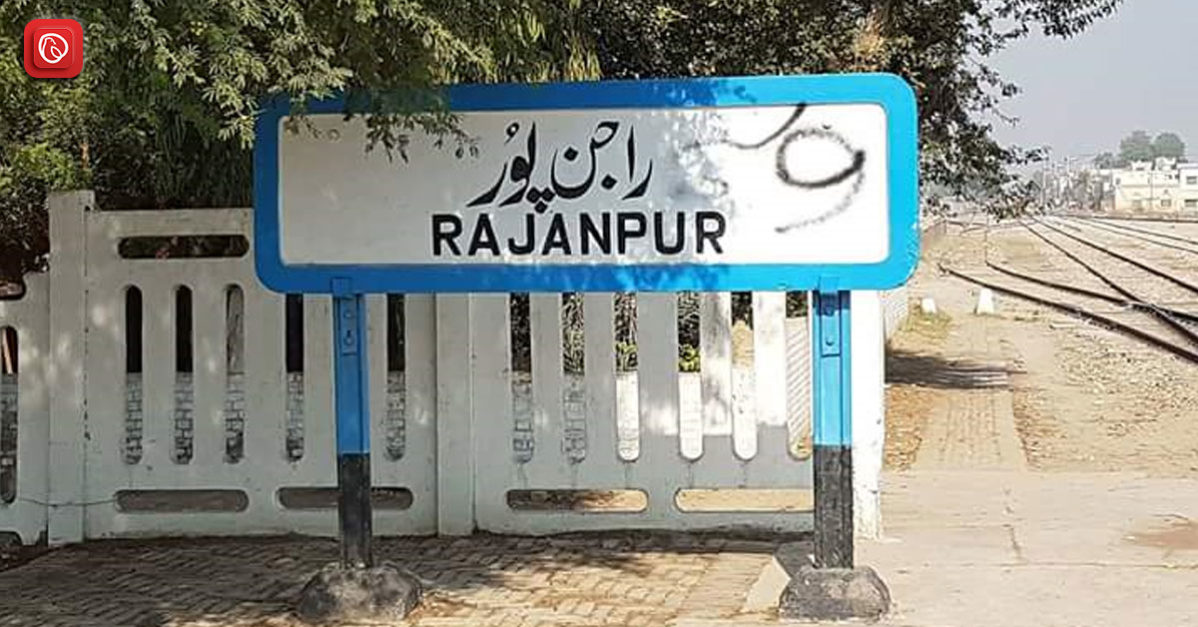The city of Rajanpur is located in Punjab, Pakistan. It is situated in the far southwest of Punjab and acts as the district headquarters for Rajanpur. The western border of the city is formed by the Indus River. In 1982, it was established as a new district concurrently with the division of Dera Ghazi Khan. The location is significant geographically since it shares a border with Sindh and Baluchistan.
In the past, it was also a commercial route. The famous Harand Fort is also situated in this part of the country. The historical significance of the district is highlighted in this blog. To understand the historic, cultural significance and importance of its strategic location, Graana.com has crafted this informative blog. For more details, keep scrolling.
Location
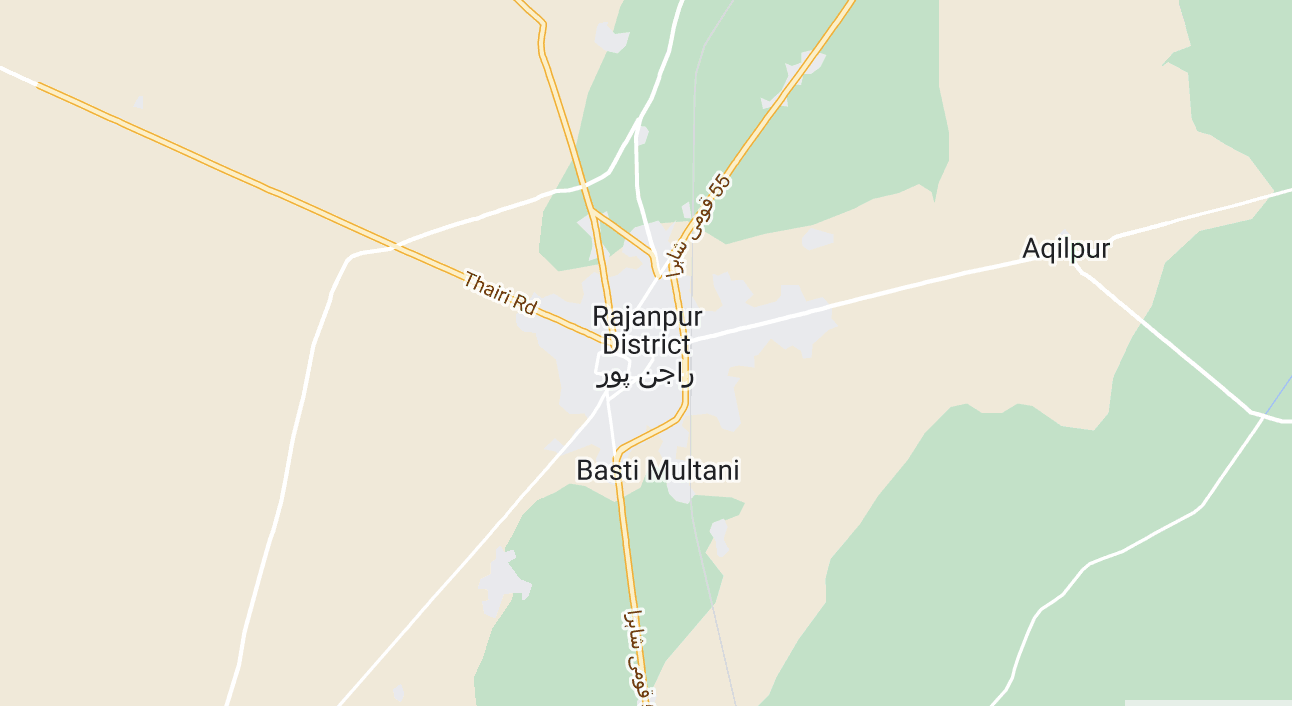
The District is situated between latitudes 28° 25′ and 29° 48′ north and longitudes 69° 19′ and 70° 45′ east. It is located on the mighty Indus river’s western bank.
In the north of the District, lies the district of Dera Ghazi Khan, districts Rahim Yar Khan and Muzaffargarh to the east across the Indus River. The south is bordered by Jacobabad district and on the western bordered are located the districts of Barkhan and Dera Bugti.
The thin strip of District Rajanpur occupies a significant strategic location s it is situated in the far southwestern corner of Punjab. In terms of area, the district is spread across 32 km to 64 kilometres.
Most people who live there are Baloch and Saraiki’s. The names of villages, and Tehsils included in the district are given below.
| Tehsil Names | Rajanpur, Jampur, Rojhan, |
| Cities, Towns, and Villages Names | Mehray Wala, Dera Dildar, Basti-Abdullah, Rajanpur (district headquarters), Marri, Mithankot, Hairo, Kin, Rasool Pur, Miran Pur, Jampur, Kotla Mughlan, Mohammadpur Diwan, Asni, Harand, Rojhan, Dajal |
Demographics
The district is one of the major districts of the province Punjab of Pakistan. Since it is located at the border of three provinces i.e. Sindh, Punjab and Baluchistan, it presents a beautiful blend of different cultures. In terms of ethnicity, most of the population comes from Baloch and Saraiki lineage.
In the following table, you will find extensive data about demographics and geography of the district.
| Attribute | Value |
| Name of District | Rajanpur District |
| District Headquarter | Rajanpur City |
| Population | 1,995,958 persons |
| Area | 12,318 km2 |
| Population Density | 159.3 persons per km2 |
| Major Economic Activity | Agriculture with its Allied Livestock Breeding & Fishing (76.7%), Wholesale/Retail Trade, Hotels/Restaurant (4.9%), Construction (9.0%), Community, Social & Personal Services (7.6%), Others (1.8%) |
| Main Crops | Cotton, wheat, sugarcane, groundnut, gram, guar seed, rice, jowar, bajra, maize, moong, Maash, Masoor, rapeseed, mustard, sunflower, sesamum, Sugarbeet, linseed, tobacco |
| Major Fruits | Guavas, mangoes, citrus, dates, ber, loquat, mulberry, watermelon, musk melon |
| Forests (area) | 14,000 HA |
| No. of Grid Stations | 06 grid stations, ranging in capacity from 66 KV to 132 KV |
| No. of Telephone Exchanges | 20 telephone exchanges, ranging in capacity from 60 lines to 2,410 lines |
| Major Industry | Cotton Ginning & Pressing (60 Units), Rice Mills (33 Units), Flour Mills (08 Units), Sugar Mills (1 Units) |
| Household Size | 7.3 persons per house |
How to Reach the district?
Here’s how to reach the district from some of the major cities of Pakistan:
From Islamabad
- By Road: Rajanpur and Islamabad are roughly 527 miles apart. You can take the M-2 motorway from Islamabad to Lahore, and then take the N-5 highway to Multan. From Multan, take the N-55 Indus Highway towards Rajanpur. The 8–10-hour vehicle ride could take longer, subject to traffic.
- By Train: There are several trains that link Rajanpur with Islamabad. The journey by train may take twelve or fourteen hours.
- By Air: There are no direct flights between Islamabad and Rajanpur. An alternative route is to go from Islamabad to Multan, from where it takes 2.5 hours to go to Rajanpur by bus or taxi.
Lahore to Rajanpur District
- By Road: Rajanpur is almost 370 km away from Lahore. From Lahore, you can travel the Lahore-Islamabad motorway to Multan, and from there, you can travel the N-55 Indus Highway to Rajanpur. Based on traffic, the vehicle trip could take five to six hours.
- Via Train: Lahore and Rajanpur are connected by a number of trains. By train, the trip can take eight or ten hours. For the most recent timetable and prices, see the Pakistan Railways website at https://www.railways.gov.pk.
- By Air: Rajanpur and Lahore do not have direct flights. Alternatively, you can travel from Lahore to Multan, from which it takes about 2.5 hours by bus or taxi to the district of Rajanpur.
Multan to Rajanpur District
- By Train: This route involves taking a taxi from Multan to Jahanian followed by a train ride from Jahanian to Liaquatpur. Research train schedules and fares in advance to ensure smooth connections between your taxi ride and the train journey.
By Road: This is the most popular option. Take a bus from Multan’s terminal to Sadiqabad, followed by a taxi ride to reach Rajanpur. Look up bus companies and schedules online or at the terminal.
Places to Visit
The district doesn’t have many ancient buildings or ruins, but it does have several historical locations that are important to the local culture, particularly for Sufi pilgrims. Some of them are as follows:
The Fort of Harand aka Lal Garh
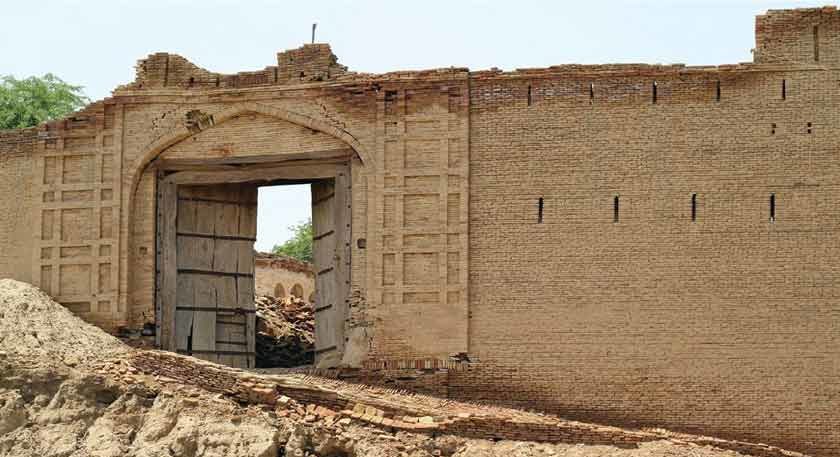
The Fort of Harand, sometimes called Lal Garh, stands watch over the district, Pakistan, and whispers stories of its colonial past. Some people think the British Raj built it; however, its precise origins are still up for debate.
This massive, 50-acre construction features an unusual 16-sided layout and was formerly home to an outer wall spanning a kilometre.
While the eastern gate and a few refurbished rooms remain inhabited by the Border Military Police, other portions of the fort are now in ruins. The Fort of Harrand is still an important monument and a reflection of a different time despite its advanced age. Such cultural and historic landmarks boost the tourism industry of Pakistan.
Hazrat Khawaja Ghulam Farid Mazar
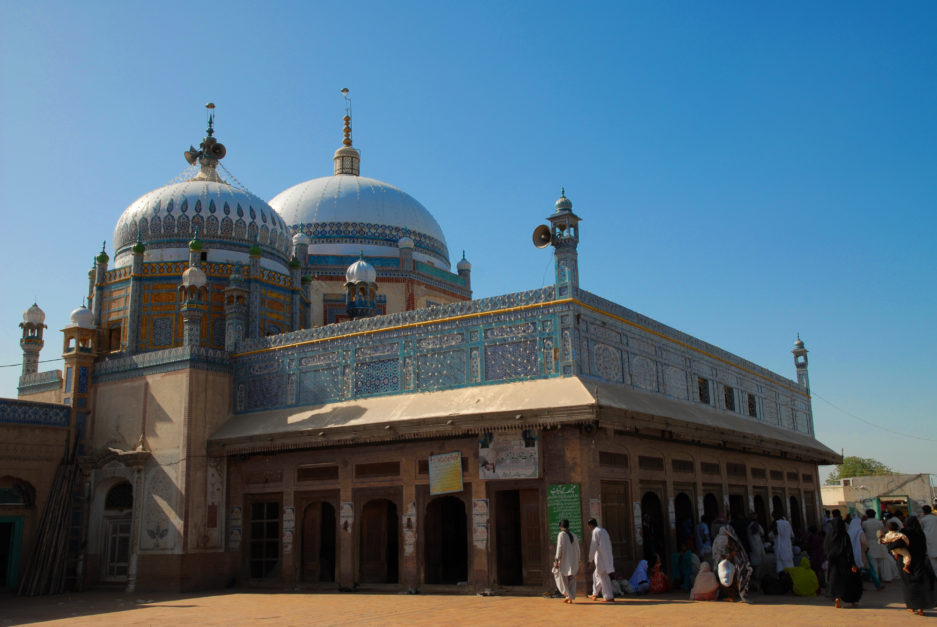
The Mazar of Khawaja Ghulam Farid, a poet and Sufi saint known for his moving Saraiki poetry, is shining in Rajanpur, Pakistan. His last resting place is this calligraphy-adorned, white-marbled refuge.
Thousands of people come together for his Urs every year, filling the air with qawwali and prayers. A symbol of Sufi customs, the shrine provides insight into the man’s legacy and the lasting influence of his teachings.
Hazrat Khawaja Noor Muhammad Narowala Mazar
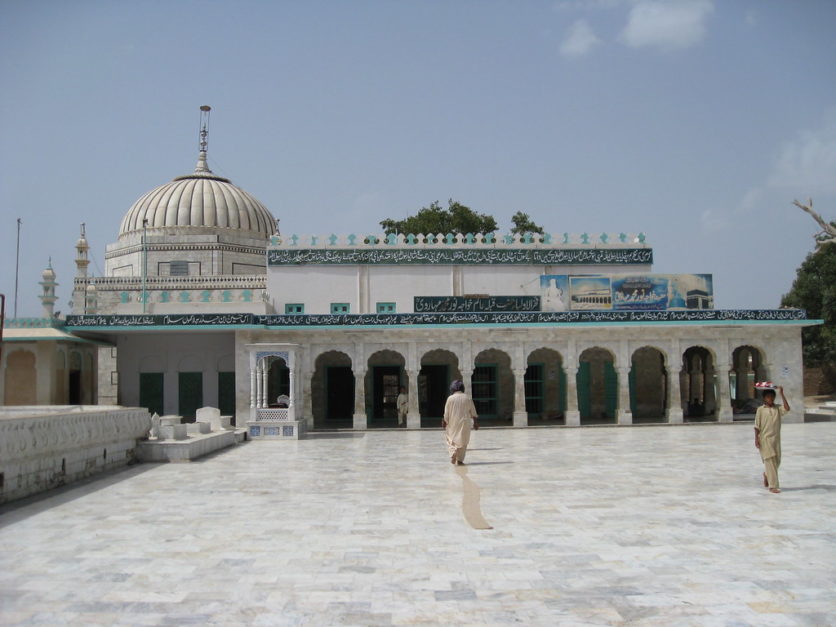
In Rajanpur, the Mazar of Hazrat Khawaja Noor Muhammad Narowala unveils its spiritual aura. Its historical significance is obscured, yet there is no denying its importance as a pilgrimage site. Particularly during the saint’s Urs, devotees swarm to this location to offer prayers and ask for favours.
An important part of the city cultural legacy, this hallowed mausoleum bears witness to Hazrat Khawaja Noor Muhammad Narowala’s ongoing influence.
Historical Significance of Rajanpur
After defeating the Nahar clan, Makhdoom Rajan established the town of Rajanpur in 1732 AD. The town gained significance only in 1862 when government buildings were relocated from nearby Mithankot to Rajanpur owing to flooding.
This modification signalled a radical shift. The 19th century saw the construction of vital infrastructure, such as electricity, better roads, canals, and railways. These successes drew people and agriculture to the verdant areas, and Rajanpur prospered in the direction of Dera Ghazi Khan and Aqilpur. Rajanpur developed into a thriving town from a small village.
FAQs
Here are some of the FAQs on the district:
Is Rajanpur in Punjab or Sindh?
Rajanpur district is in the province of Punjab.
What is the district famous for?
Rajanpur is famous to produce sugarcane and cotton. Besides the region also yields rice, wheat and a minimal amount of tobacco as well.
Is Rajanpur in Multan?
Rajanpur is not located in Multan; it is a separate district located towards the southwestern border of Punjab.
What is the religion of people in the district?
Majority of the population in Rajanpur district is Muslim.
What is the economy of the district?
The economy of the district is mostly based on the cultivation of livestock and fish farming as well as agriculture.
What are the famous places in the district?
The district comes with multiple historic sites which are popular among tourists. Some of them are Shrine of Hazrat Khawaja Noor Muhammad Narowala, and Lal Garh.
Which province is Rajanpur in?
The district is located in the province of Punjab.
How many Tehsils are there?
District Rajanpur comprises of four tehsils namely, Jampur , Rajanpur, and Rojhan.
What is the Climate of the district?
The district has an annual temperature of 31.39ºC (88.5ºF), which is 10.5% higher than the average for Pakistan. Rajanpur has 48.03 wet days (13.16% of the total number of days) and receives roughly 22.45 millimetres (0.88 inches) of precipitation yearly.
This was all about Rajanpur. For more information, visit Graana.com.
